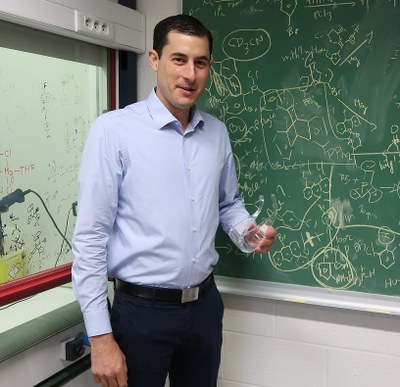Guillaume Berionni
Research
 MIS project: Bifunctional Boron Catalysts and Receptors
MIS project: Bifunctional Boron Catalysts and Receptors
Small molecules such as H2, O2, CO, CO2 and CH4 constitute abundant reservoirs of chemical energy. Their efficient and sustainable transformation into highly valuable chemical feedstocks and fuels is an important challenge in modern chemistry. These molecules, however, feature inert bonds and their activation depends largely on overcoming high kinetic barriers. Most industrial processes related to small molecule activation are based on rare transition-metals catalysts and require harsh reaction conditions.
Establishing new methods for activating small molecules without transition-metals constitute thus an important goal, both environmentally and economically. Therefore, the key focus of our research is the engineering of novel catalysts containing exclusively abundant and inexpensive chemical elements, for activating and converting these small molecules more efficiently. As this new catalysis technology is reliant on the production of strong organic acids and bases, we are also producing new types of acids and bases, specifically designed for activating inert chemical bonds cooperatively. These fundamental and applied investigations are of high interest for the successful development of large-scale catalytic activation processes.
Besides, we conduct additional research projects on the kinetic, thermodynamic and mechanistic investigations of new chemical reactions (hydrogenations, hydrocarbations, hydroborylations) by using advanced spectroscopic characterization methods.
Guillaume Berionni's NARC fellowship started on 1 October 2018 and finishes on 30 September 2020.
Presentation
Guillaume Berionni received his PhD in 2010 from the University of Versailles (Lavoisier Institute) for his research on physical organic chemistry. He then moved to the Ludwig Maximilian University of Munich as a Humboldt postdoctoral fellow under the guidance of Prof. Herbert Mayr and Prof. Paul Knochel. Since 2017 he is Professor of chemistry (Lecturer) at the University of Namur, where he is managing a research team of several PhD students, post-doctoral fellows and master students. He is actively involved in teaching, especially at the master's level. In 2018 he received an Incentive Grants for Scientific Research (“Mandat d'impulsion scientifique MIS”) from the FNRS for developing the research project “Bifunctional Boron Catalysts and Receptors”.
Contact: Guillaume Berionni
Research links
Research group website: Laboratory of Reactivity and Organic Catalysis
Other UNAMUR memberships














